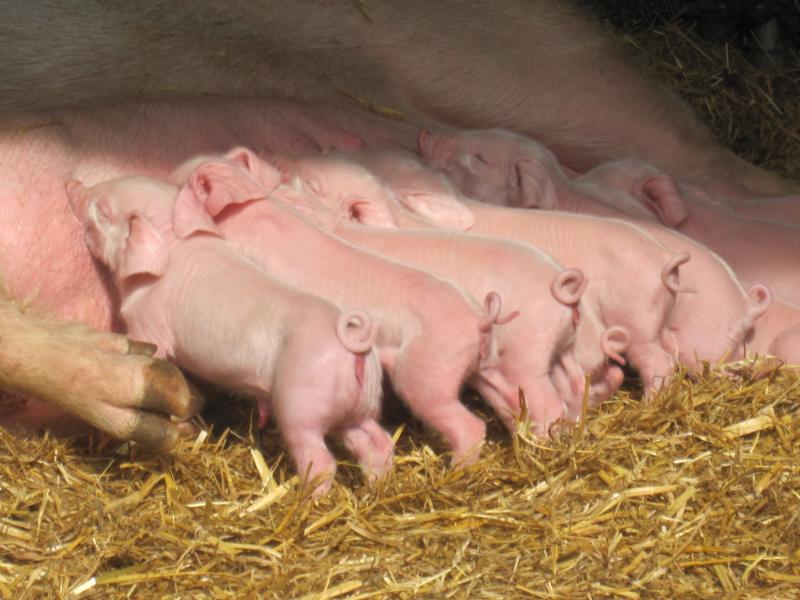
Maternal diet influences performance of weaned pigs.
Recent research carried out at Lyons Farm, by Professor John O’Doherty and Professor Torres Sweeny, has shown that supplementation of the sow’s maternal diet may influence growth performance and gastrointestinal physiology of weaned pigs.Research, at Lyons Farm, has shown that supplementation of the sow’s maternal diet may influence growth performance and gastrointestinal physiology of weaned pigs. The research, carried out at by Professor John O’Doherty and Professor Torres Sweeny, showed that dietary laminarin and fucoidan supplementation of sows enhanced colostral IgG concentrations and serum IgG concentrations of suckled piglets. This indicates that an immunomodulatory property of the laminarin-fucoidan mix is responsible for the elevated colostral IgG concentrations.
The maternal supplementation with seaweed extracts appears to have enhanced the immunoglobulin status of the piglets and also appears to have enhanced the ability of the piglets to fight pathogenic bacterial challenges. Piglets suckling sows supplemented with seaweed extract containing laminarin and fucoidan had improved resistance to e. coli infections and reduced shedding of this pathogen post-weaning following an e. coli challenge. In addition, piglets suckling sows supplemented with laminarin had improved resistance to an experimental salmonella challenge and reduced shedding of this pathogen post-weaning.
A longer-term study showed that pigs from laminarin and/or fucoidan supplemented sows had greater nutrient digestibility, greater villous architecture and gut absorption capacity at weaning and had higher daily gain than control pigs for the duration of the studies. The sows were supplemented with laminarin and/or fucoidan from day 87 of gestation and the offspring were monitored until time of slaughter, at approximately 90 kg.
This is an exciting development showing that not only can supplementation of the sow’s maternal diet influence the performance and immune status of her offspring but that the benefits are carried over to the weaned pigs resulting in improved performance and the possibility of a reduced requirement for the use of antibiotic growth promoters (AGP) in weaning pig diets.
Background
In modern pig production, weaning is a major stress in the pig’s life. The occurrence of post-weaning diarrhoea and the subsequent growth check cause large economic losses for the pig industry worldwide. Traditional measures to reduce weaning-associated intestinal disorders have centred on dietary inclusion of antibiotic growth promoters (AGP) in weaning pig diets, or high concentrations of dietary minerals in the form of zinc oxide at doses well above nutritional requirements.
The direct purpose of these additives is to suppress the growth of pathogenic bacteria such as Escherichia coli (E. coli) and salmonella. The overuse of antibiotics is closely related to the growing number of antimicrobial-resistant agents and raises important concerns about animal and also human health. As a consequence of these concerns, the EU implemented a full ban on antibiotic growth promoter usage (AGP) in livestock diets in January 2006. The feeding of pharmacological doses of zinc oxide to pigs is also being discouraged because of its link to an increase in antibiotic resistance and zinc accumulation in the environment.
Historically, seaweeds have always been known for their medicinal properties. Seaweed extracts are now showing a wide range of biological activities – anti-oxidant, anti-cancer, anti-coagulant and anti-inflammatory activities among others – with potential use in the food and nutraceutical markets. Previous research at Lyons Farm has shown that whole milled seaweed and whole seaweed extracts have very limited value in pig diets but the sugars laminarin and fucoidan in particular are most interesting with potent biological activities in pigs.